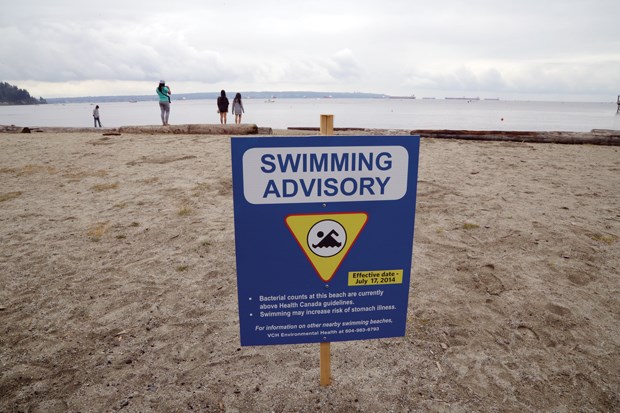The coast is clear for swimming again at West Vancouver beaches.
Vancouver Coastal Health lifted an almost week-long warning against swimming at Ambleside, Dundarave and Sandy Cove beaches Wednesday after water quality test results returned to safe levels.
Results of the latest tests conducted on Monday put the figures used to calculate safe levels of E. coli bacteria back into acceptable range, despite one high test sample at Dundarave beach, said health authority spokeswoman Anna Marie D’Angelo.
Officials still don’t know what caused the sudden spike in E. coli levels at three West Vancouver beaches last week.
The beaches had previously recorded low bacterial counts of under 30 units of E. coli. Last week they suddenly measured huge spikes — to more than 4,600 units of bacteria per 100 millilitres in one sample taken at Ambleside on July 18 and over 2,000 units in two Dundarave samples.
Canadian Recreational Water Quality Guidelines recommend that the public be warned water is unsafe for swimming when bacteria counts reach over 200 units of E. coli in 100 ml of water.
The numbers were particularly unusual in that water quality at West Vancouver beaches is rarely a source of concern.
So far the best guess about what happened is “there was some sort of discharge of effluent into the water,” said D’Angelo. Following the spike in numbers, authorities tested samples from the Lions Gate Sewage Treatment plant and checked for discharge from manholes and found nothing amiss, said D’Angelo.
So far, health authorities haven’t been made aware of any large discharges from ships, said D’Angelo.
While it’s now safe to go back in the water, West Vancouver resident Bill Small said he was less than impressed with the actions of municipal employees at Ambleside while the advisory was in effect.
Small said he walked along the beach while the warning was in place and noticed several groups of people — including those with young children — in the water. When he asked, they told him they hadn’t seen the warning signs — which Small said were placed so far apart they would have been easy to miss.
Small said the lifeguards on duty also didn’t seem concerned that people were in the water. When he asked why people weren’t being informed of the advisory, they told him it wasn’t their job, he said.
Jeff MacDonald, spokesman for the District of West Vancouver said after Small complained, the district took steps to make the warning signs more obvious and the lifeguards’ supervisors “took some steps to help them understand what their role could be” in keeping the public informed.
The most recent test results of the three beaches conducted on Monday came back with most samples showing under 100 units of E. coli per 100 ml of water. One sample at Dundarave remained high at 1,600 units of E. coli. When results are examined over the course of the month, however, numbers are still within acceptable limits, said D’Angelo.



